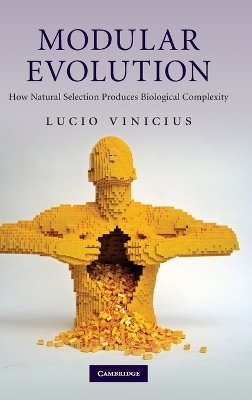
Modular Evolution
How Natural Selection Produces Biological Complexity
Seiten
2010
Cambridge University Press (Verlag)
978-0-521-42964-1 (ISBN)
Cambridge University Press (Verlag)
978-0-521-42964-1 (ISBN)
Natural selection is more than survival of the fittest: it is a force engendering higher biological complexity. Presenting a new explanation for the tendency of life to become more complex, this book offers an introduction to the key debates in evolutionary theory, and a reinterpretation of humanity's place in evolution.
Natural selection is more than the survival of the fittest: it is a force engendering higher biological complexity. Presenting a new explanation for the tendency of life to become more complex through evolution, this book offers an introduction to the key debates in evolutionary theory, including the role of genes and sex in evolution, the adaptive reasons for senescence and death and the origin of neural information. The author argues that biological complexity increased through the process of 'modularity transfer': modular phenotypes (proteins, somatic cells, learned behaviours) evolved into new modular information carriers (regulatory proteins, neural cells, words), giving rise to new information systems and higher levels of biological organisation. Modular Evolution makes sense of the unique place of humans in evolution, both as the pinnacle of biological complexity and inventors of non-biological evolution.
Natural selection is more than the survival of the fittest: it is a force engendering higher biological complexity. Presenting a new explanation for the tendency of life to become more complex through evolution, this book offers an introduction to the key debates in evolutionary theory, including the role of genes and sex in evolution, the adaptive reasons for senescence and death and the origin of neural information. The author argues that biological complexity increased through the process of 'modularity transfer': modular phenotypes (proteins, somatic cells, learned behaviours) evolved into new modular information carriers (regulatory proteins, neural cells, words), giving rise to new information systems and higher levels of biological organisation. Modular Evolution makes sense of the unique place of humans in evolution, both as the pinnacle of biological complexity and inventors of non-biological evolution.
Lucio Vinicius is a Postdoctoral Fellow at the Leverhulme Centre for Human Evolutionary Studies in Cambridge, UK. He has published articles in various fields including life history evolution, Drosophila genetics, brain evolution and human growth.
Preface; 1. From natural selection to the history of nature; 2. From the units of inheritance to the origin of species; 3. Multicellularity and the developmental code; 4. Life cycle evolution: life and death of the soma; 5. Sex and its consequences: the transition that never happened; 6. Animal societies: the case of incomplete evolutionary transitions; 7. The new 'Chain of Being': hierarchical evolution and biological complexity; References; Index.
| Erscheint lt. Verlag | 15.7.2010 |
|---|---|
| Zusatzinfo | 2 Tables, black and white; 4 Line drawings, black and white |
| Verlagsort | Cambridge |
| Sprache | englisch |
| Maße | 156 x 235 mm |
| Gewicht | 510 g |
| Themenwelt | Naturwissenschaften ► Biologie ► Evolution |
| ISBN-10 | 0-521-42964-1 / 0521429641 |
| ISBN-13 | 978-0-521-42964-1 / 9780521429641 |
| Zustand | Neuware |
| Informationen gemäß Produktsicherheitsverordnung (GPSR) | |
| Haben Sie eine Frage zum Produkt? |
Mehr entdecken
aus dem Bereich
aus dem Bereich
Wie die Vernichtung der Arten unser Überleben bedroht - Der …
Buch | Softcover (2023)
Penguin (Verlag)
CHF 20,95


